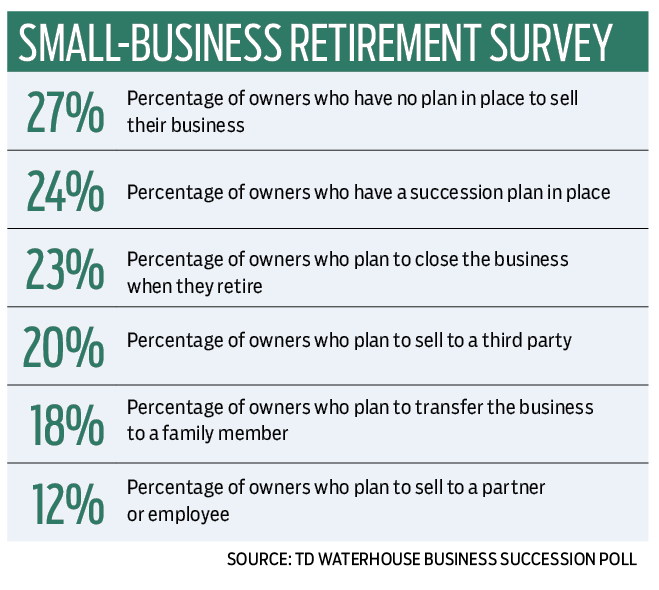PricwaterhouseCoopers, in a recent report, predicts a “highly competitive buyer’s market between 2018 and 2025” for family businesses.The report also suggests that many owners will not receive the nest egg they hoped for.
Overall, the sale of small businesses over the next 10 years will involve a massive transfer of assets – estimated at between $1 trillion and $4 trillion in Canada. If a large percentage of those businesses simply close, it could damage the economy through a significant loss of employment.
Selling your business can be an organized process that maximizes profit and expedites the sale, or it can be a dismal failure full of gut-wrenching interactions and tremendous amounts of your money left on the table.
Fortunately, the choice is yours. A good exit strategy starts with simple awareness of the process of selling and can be implemented in advance in your day-to-day activities with little additional effort.
Eyes wide open
Think of the sale of your business in health terms – no preparation as last-minute surgery with no anesthesia, or a defined exit strategy as preventive medicine.
Your exit strategy begins with awareness that one day you will sell your business. Reasons vary for each business owner and can be as simple as retirement or as complex as health or divorce.
Only you know or will decide when it is time for you to sell. However, having implemented an exit strategy will ensure maximum profit at the sale and great peace of mind should you be selling under less favourable circumstances such as the mental duress of a downturn in business or poor health. Treat this exercise no differently than the insurance you have in place to protect your assets.
Once the decision to sell is made, contacting a business broker or other intermediary to discuss the market conditions and the various options you have to sell your business is imperative.
Understanding value
A key process you will want to undertake is that of a business valuation. Typically, this involves a systematic process by which your financial information is normalized – upon which a reasonable and critical assessment of an opinion of value will be derived, as based on various methodologies, your specific knowledge of the business, current market conditions, future growth potential and opportunity, etc.
Remember, buyers are motivated by both the reason the business is for sale and the price being presented. They will not pay for improbable opportunities that are without substance. By understanding your business value, you will have the perspective and tools by which to plan your next steps.
Most businesses are sold to persons not familiar to the seller, and sales are done through a broker who facilitates the transaction, working in the vendors’ best interest. Buyers can be entrepreneurs that have the same zeal you had when you started your business or industry players that will purchase your business to expand or enhance theirs.
A qualified business broker can be instrumental in helping you define an exit strategy that encompasses the sale scenario viewed from every angle. You will want to discuss a buy-sell agreement with your business broker and other professionals, namely your lawyer, accountant and financial adviser.
Existing agreements with partners, stockholders, landlords and others will be examined to ensure your goals, expectations, and terms and conditions of sale are not rendered void and as few as possible conflicts arise during the due diligence process. Due diligence is the process of verifying the accuracy of the assertions made regarding your business.
View your exit strategy from the viewpoint of a buyer. What would you be looking at and for if you were to buy your business? Do your profit and loss statements match your balance sheets and tax returns?
Imagine the lack of confidence you would have to move forward as a buyer of your business if discrepancies arose in your financial documents at the due diligence stage of the sale. What about the physical state of your facility? If you were the buyer, would you want to walk into a facility that needed immediate attention or a facility that was clearly neat, clean and organized, allowing you to transition easily into the pertinent matters at hand and not worry about disorganization and safety issues?
Are your employees engaged in the business? And what would your clients say about you if they were randomly called? Are your sales and profits on the increase and expenses on the decrease?
The purpose of the exit strategy is to apply that required effort necessary to achieve maximum profit for minimum effort when you do sell. Working on these issues a little bit each day brings huge profit and joy tomorrow.
Tax considerations
Tax consequences and what you will do with both money and time after the sale is finalized need to be considered. Many times, to close a deal you will be asked to help in some capacity with the transition. Again, you will want to determine in advance, with the help of your accountant or financial adviser, how the proceeds of the sale will be best distributed and conserved.
The financing arrangements and/or cash at closing will greatly affect your tax position, and all options should be considered. Can you get more for your business by offering terms on a carry-back note and still protect your interests and save on taxes? Being proactive at this stage will greatly enhance profits at the sale.
With your plan laid out and preliminary players like an accountant and a business broker identified, you can now break it down into bite-sized pieces that can be a part of your everyday business routine.
If your business sells for 10 per cent more due to this organization and planning, you may have just put a significantly larger sum in your pocket by simply being prepared.

For more on retirement preparedness, see an infographic at www.biv.com/navigating and read our new Retirement Ready magazine at https://www.biv.com/magazine/retirement-ready-2016/
Arthur Klein is a business broker with Pacific Business Brokers Inc./Pacific Mergers & Acquisitions Inc. He is an accredited certified business intermediary as administered by the International Business Brokers Association. He also holds a B.C. real estate commercial trading services licence. He can be contacted at 778-329-9558.




